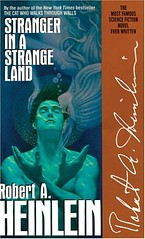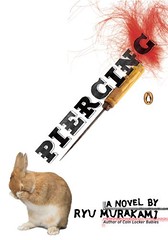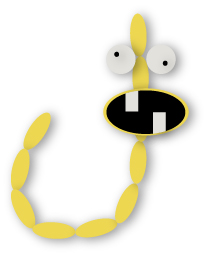
Stranger in a Strange Land / Robert A. Heinlein
New York : Ace Books, c1987
Originally published: 1961
438 p.
Here is Heinlein's masterpiece -- the brilliant spectacular and incredibly popular novel that grew from a cult favorite to a bestseller to a classic in a few short years. It is the story of Valentine Michael Smith, the man from Mars who taught humankind grokking and water-sharing. And love.
I'm having trouble starting this review because I have such ambivalent feelings about this book. The first half -- and you'll hear this a lot -- was great, but the second half degenerated into drawn-out proselytizing that was outdated, self-important, and most of all boring.
The book takes place in a not-too-distant future. The first mission to Mars takes place, and someone thought it'd be a good idea to have 4 married couples go because obviously it's so important that everybody be able to have sex on the way and what could possibly go wrong?
The answer is everything could go wrong because one of them gets pregnant, dies in childbirth, her husband isn't the father, jealous murder, yadda yadda, basically the baby is raised by Martians and picked up over 20 years later by the crew of the second mission to Mars. Nevermind how a baby can survive on Mars with no air, running water, or formula with a species that we find out later in the book throws babies out the window and lets them fight for their own survival. This was written in 1961 when we still thought the moon was made of cheese, so you just have to accept it.
Anyway, the alien-raised human is named Mike Smith, and through some legal weirdness of Earth-That-Will-Be, he's a billionaire. Also, in an amusing jab at mankind's obsession with imperialism, he ends up basically King of Mars. The latter is legally dismissed eventually. Anyway, this is a great premise, and the first half of the novel is excellent. Smith has no concept of human culture, language, or thought, and characters like this are perfect for dissecting and criticizing the human condition... if they're written well.
And Mike is definitely written well at first. Innocence like his can only be captured by an talented and self-examining author, whom we apparently have here. The way the government reacts to him and tries to manipulate the situation is also hauntingly realistic. Kudos, Heinlein.
So Mike lives in a government hospital for a while, though the government lies and keeps him captive, which is fine because he is perfectly content knowing nothing more. But a nurse, Jill, helps him escape, and they wind up at the house of Jubal Harshaw, a doctor/lawyer/recluse/general grumpypants, who lives how he wants with three secretaries and two men who work as electrician and groundskeeper. The best parts of the book take place here because Jubal is a fun character. He's a smart, jaded, irascible libertarian who I pretty much hope to be when I grow up.
Mike and the others learn from each other, and everything is great until the third section of the book starts and everything turns around. Suddenly Mike left with Jill and they join some carnaval or something and she dances in vaudeville acts (which is just as satisfying as nursing because as much as people laud Heinlein for his empowered female characters, they're ultimately exploited) and then suddenly Mike discovers why people laugh (to make the pain go away) and has sex and totally understands humanity all of a sudden. It's hard to explain, none of the characters develop any further except to join the extreme SEX CULT Mike starts where everyone lives in harmony and learns the Martian language, which grants them special powers like telepathy, telekinesis, and never having to eat or sleep. Everyone has sex with everyone (except no gay touching, that is a wrongness) and we all live happily ever after and Mike dies like Jesus or something and they eat soup made of him. I'd go more into it, but it's really not worth it and I need to take a shower in a minute.
The whole philosophy was pretty revolutionary for the age. If you consider this book was plotted through the '50's and published in '61, it anticipated the free love movement, and indeed "grokking" and "water sharing" are still aspects of what's left of that movement. But honestly, the book just got dull and preachy. All the characters changed on a totally transparent level, just accepting this great new life. Nobody developed, there was very little naval-gazing... even the writing style got worse. It was all told in long, boring conversations by people who were obviously just standing in for Heinlein's own voice. It read more like a manifesto with characters than a real story.
As a historical document of the '60's, I suppose it has value, but you're much better off reading actual historical documents. The novel itself is totally skippable.
The oddest thing about Heinlein's free-love utopia is that I can't tell if he's actually in favor of it. Yes, he's clearly pushing it since by the end of the novel, almost every character is immersed in it and ostensibly a drooling, shiny happy, but there's this ellusive cynical undertone I can't put my finger on. It might be that Jubal never officially joins up with the Martian hippies because, as he claims, he's too old and set in his ways at this point. Since Jubal has been Heinlein's own voicebox, maybe the cynicism I'm picking up is the author's jealousy of his own characters. Maybe he regrets never being able to live in the society he is promoting.
I dunno, obviously I'm making stuff up at this point so I'll stop. I didn't even like this book, why am I still here?













